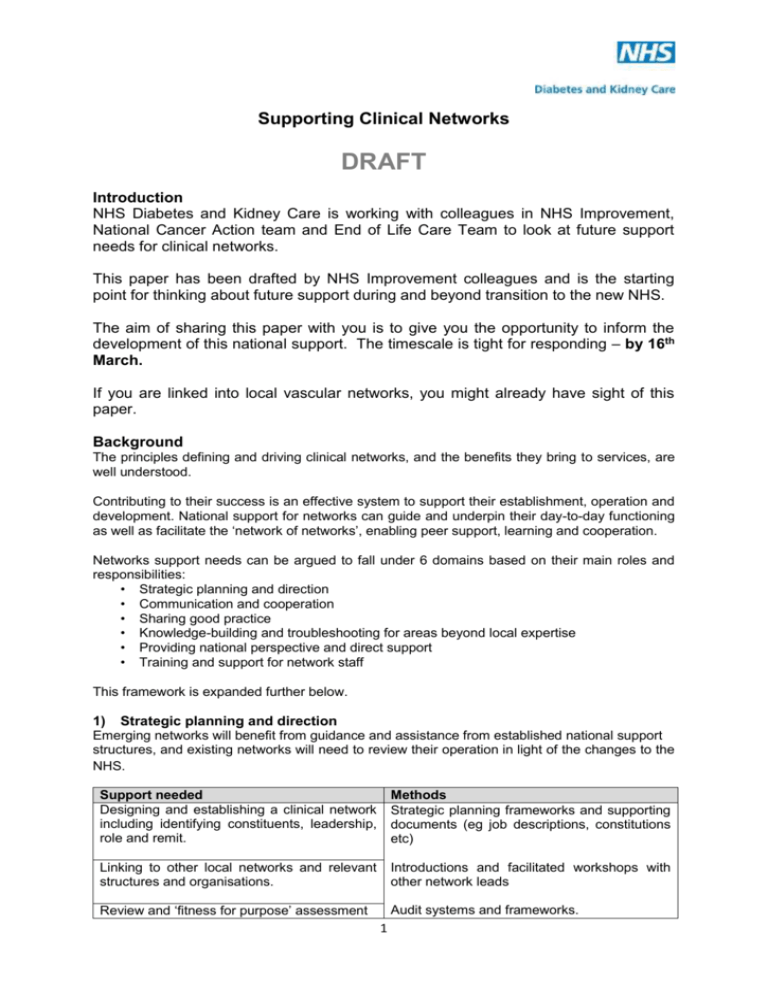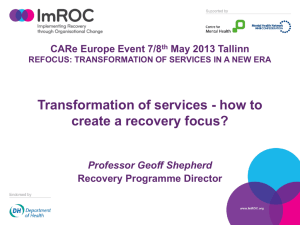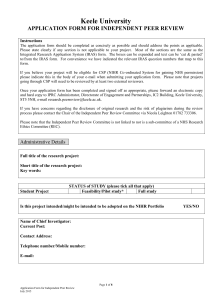Supporting Clinical Networks DRAFT
advertisement

Supporting Clinical Networks DRAFT Introduction NHS Diabetes and Kidney Care is working with colleagues in NHS Improvement, National Cancer Action team and End of Life Care Team to look at future support needs for clinical networks. This paper has been drafted by NHS Improvement colleagues and is the starting point for thinking about future support during and beyond transition to the new NHS. The aim of sharing this paper with you is to give you the opportunity to inform the development of this national support. The timescale is tight for responding – by 16th March. If you are linked into local vascular networks, you might already have sight of this paper. Background The principles defining and driving clinical networks, and the benefits they bring to services, are well understood. Contributing to their success is an effective system to support their establishment, operation and development. National support for networks can guide and underpin their day-to-day functioning as well as facilitate the ‘network of networks’, enabling peer support, learning and cooperation. Networks support needs can be argued to fall under 6 domains based on their main roles and responsibilities: • Strategic planning and direction • Communication and cooperation • Sharing good practice • Knowledge-building and troubleshooting for areas beyond local expertise • Providing national perspective and direct support • Training and support for network staff This framework is expanded further below. 1) Strategic planning and direction Emerging networks will benefit from guidance and assistance from established national support structures, and existing networks will need to review their operation in light of the changes to the NHS. Support needed Designing and establishing a clinical network including identifying constituents, leadership, role and remit. Methods Strategic planning frameworks and supporting documents (eg job descriptions, constitutions etc) Linking to other local networks and relevant structures and organisations. Introductions and facilitated workshops with other network leads Review and ‘fitness for purpose’ assessment Audit systems and frameworks. 1 2) Communication and cooperation Networks benefit from a managed system to channel relevant and/or interesting information. This provides links to the broader world of service improvement and development, as well as promoting the ‘network of networks’ essential for peer support and mutual learning. Support needed Promotion of awareness developments in clinical, improvement arenas. Methods of relevant policy and Regular facilitated peer meetings of network clinical and managerial leads Electronic dissemination of information through network specific web pages and email bulletins Peer support and cooperation, bring networks together for mutual support and learning. Linking networks, and their constituent services, with national bodies and policy representatives (eg DH, NCB) Web of contacts with relevant national bodies, facilitating input of national clinical and policy leaders 3) Sharing good practice Networks are a crucial vehicle for spreading learning on good practice and improvement, speeding up the adoption of innovation and more efficient approaches to care. An essential support role is to ‘oil the wheels’ of networks learning from each other and from elsewhere Support needed Case studies of effective service improvement Methods Database of improvement case studies Collated and analysed learning showing underpinning principles and ‘top tips’ Effective community of networks in regular contact and cooperating Improvement system Easily accessed and up-to-date information Knowledgeable and expert network support team. Forums for inter-network discussion and sharing 4) Knowledge-building and troubleshooting for areas beyond local expertise National support will need to undertake investigations and/or projects to address questions raised by networks that are not soluble at network level alone. Support needed Integration of emerging areas of practice, new clinical or policy initiatives and/or innovations into local services Methods Pilot and prototype service improvement projects to define and describe effective strategies Work with wide variety of services to ensure findings applicable in all settings and develop adaptability criteria Produce learning resources and case studies highlighting critical success factors Distil and publish useful resources and materials Share service-developed tools and materials to increase speed of adoption and improvement. 5) Providing national perspective and direct support Network activities to support commissioning and/or service improvement, such as service reviews and pathway redesigns, improvement events and initiatives with local services, benefit from input of national perspective and collected learning from elsewhere in the country. 2 Support needed Policy and/or clinical evidence perspective on issues under development at local level Methods Leadership and/or membership of review teams investigating specific areas of service reconfiguration, providing expert advice and drawing on exemplars from elsewhere Independent overview of matters under local discussion, including ‘honest broker’ role of intra-network processes Arbitration and/or chairing of contentious issues requiring external perspective and reference. Direct facilitation and management of service improvement work with clinical teams in partnership with, or on behalf of, network support teams Work with clinical teams to bring about demonstrable, measures improvements in service outcomes, benefiting local services and providing exemplar learning for other areas 6) Training and support for network staff Support needed Training and ongoing development for network leaders and staff on a wide variety of service improvement skills, tools and approaches Development of specialist skills benefitting networks Development and support of clinical leaders Enhancing network functions in key areas such as marketing and communications Methods High-quality service improvement training courses through group sessions, electronic media and practical resources. Bespoke training on areas of particular importance to networks out with normal network capability Training, mentoring and establishing peer support systems for new and existing clinical leaders at service, network, regional and national level 3










